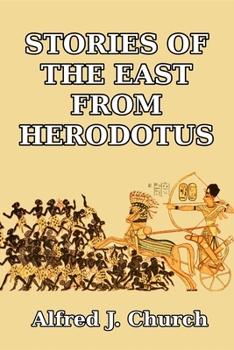Stories of the East from Herodotus
Select Format
Select Condition 
Book Overview
Herodotus, the "father of history," is possibly the most famous historian of all-and perhaps the most maligned, despite his clear warning at the start of his book that he was merely recording, not vouchsafing, those things that he had not seen himself. As a result, his accounts are often dismissed, but as Alfred Church's masterful retelling shows, this is an unjust assumption.
Starting with the reign of King Croesus of Lydia (ca. 560 BC), his wars with the Persians, and the rise of Cyrus the Great of Persia, Herodotus's story line moves through the late Egyptian dynasties, and deals with their downfall and submission to the Persians. The stories of Cyrus's successor, Cambyses, and the renowned King Darius are related, along with a fascinating-if brutal-account of the habits of many of the peoples, Indo-European and otherwise, who shaped the destiny of the Ancient Middle East.
The author is as careful as Herodotus in his relation of the ascertained facts, and writes in his preface:
"I should be sorry that readers who are not acquainted with the work of the 'Father of History' should carry away from this book the impression that he is nothing more than a credulous and gossiping teller of stories. That he was often deceived, and that he writes with a simplicity which is quite remote from our ways of thinking, is manifest; but those who know him best are aware that he was nevertheless a shrewd and painstaking observer, whose credit has been distinctly increased by the discoveries of modern times."
This edition has been completely reset, and contains all the original text and illustrations.
Contents
Chapter I: The story of King CroesusChapter II: Croesus, wishing to make war against the Persians, consulteth the oracles
Chapter III: King Croesus is defeated and the city of Sardis is taken
Chapter IV: Croesus is saved from death. Of Lydia, the Lydians, and of certain Greeks that dwelt in Asia
Chapter V: The birth and bringing up of Cyrus
Chapter VI: Cyrus overthroweth Astyages and taketh the kingdom to himself
Chapter VII: The city of Babylon, Cyrus taketh it
Chapter VIII: Cyrus maketh war against the Massaget , and dieth
Chapter IX: Of the manners of the Egyptians
Chapter X: Of certain kings of Egypt
Chapter XI: Of certain other kings of Egypt
Chapter XII: The Persians conquer Egypt
Chapter XIII: Cambyses maketh war upon the nations round about, is stricken with madness, and so dieth
Chapter XIV: The false Smerdis is slain
Chapter XV: The kingdom of Darius
Chapter XVI: Babylon rebelleth against the king, and is taken
Chapter XVII: King Darius maketh war upon the Scythians
Chapter XVIII: Of the Scythians and other nations





